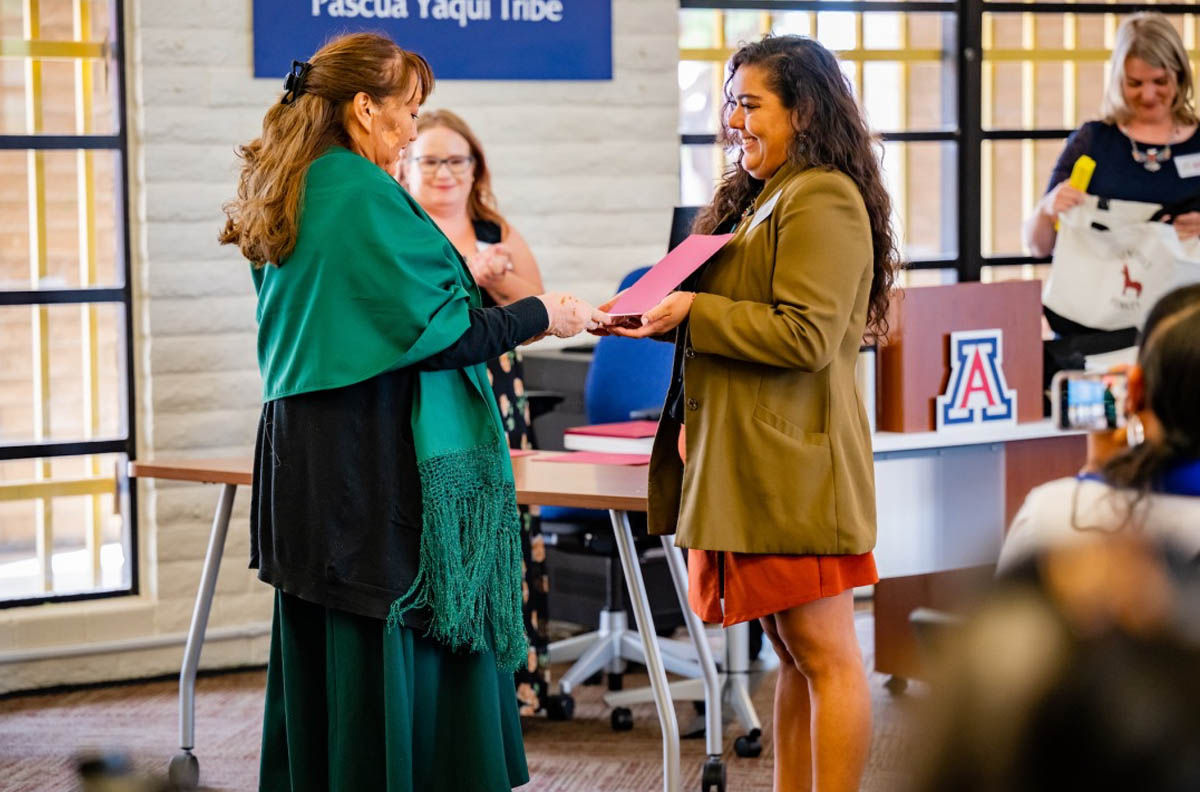
Pascua Yaqui Entrepreneur Hopes to Create Opportunities for Others
By Kyle Mittan, University Communications
Nicolette Gomez wasn’t sure what she wanted to study when she graduated high school in 2009 and started thinking about college.
As a member of the Pascua Yaqui Tribe, Gomez thought a gap year working for Casino Del Sol would be a good way to figure out her next step. One year turned into 10.

Gomez eventually earned an associate’s degree in web design from Pima Community College in 2022. She finished her degree at Pima during the height of the COVID-19 pandemic, when nearly all aspects of daily life had gone virtual.
The experience showed Gomez that living on the Pascua Pueblo Yaqui Reservation, southwest of Tucson, did not necessarily require working for a tribal enterprise.
Now a junior at the University of Arizona studying design arts and practice with a minor in entrepreneurship, Gomez wants others to know that opportunities to start a business are out there, and she wants to help them learn the skills to take advantage of those opportunities.
Gomez is the executive director of Nopalito Network, a startup that teaches web design, marketing and other technology-based skills to aspiring entrepreneurs, especially those in tribal communities. A new program that Gomez has created to work in tandem with her business, called Yaqui-Tech Innovation Lab, has helped Gomez foster a community of Pascua Yaqui entrepreneurs.
“I don’t think a lot of people realize that there is so much opportunity with remote work and being creative,” said Gomez, who goes by Niko. “You don’t have to work for big tech companies to sustain yourself and have a bit more flexibility in your life.”
‘Imagine what it could do for my community’
Gomez first began learning web design in 2018, teaching herself basic skills such as using the website builder WordPress. She eventually built the skills to start freelancing and now works for Bodhi Creative Collective, a digital marketing agency based in Los Angeles.
Many clients would ask Gomez to teach them basic web design skills, and she became more and more interested in offering deeper, more hands-on education – and to more people.
“I thought, ‘If people want to learn how to do this, imagine what it could do for my community,'” she said.
After graduating from Pima in 2022 with an associate’s degree in digital arts, Gomez knew she wanted to start a business but had no idea where to begin. That fall, she enrolled in an accelerated fundamentals course at Startup Tucson, an organization that supports local entrepreneurs. The organization’s sponsors include Arizona FORGE, a U of A unit similarly focused on growing community entrepreneurship.
There, she met Aleshia Howell, a program manager for Arizona FORGE at the time. Howell recalls Gomez coming to the course with a clear vision for what would eventually become Nopalito Network.
“She came in and she was passionate about delivering technology training to youth populations so they can understand they had more opportunities than might be obvious, especially when they’re living on the reservation,” Howell said.
The course was the first step toward a more formal education in starting a business, Gomez said.
“I learned a lot, but I said, ‘Man, if I really want to push people to do this kind of stuff, maybe I should have the experience in it a lot deeper than just DIYing it, basically,” she said.
Gomez launched Nopalito Network in September 2022, offering digital marketing services to clients, as well as programs to teach digital skills to her community. The name of the business refers to the prickly pear cactus, or nopal in Spanish, and its individual pads. The pads come together to make up the plant, she said, just like a series of opportunities have come together to allow Gomez the chance to create her own business.
“All these things have come together to create this,” she said.
She began her bachelor’s program in the College of Fine Arts last summer and expects to graduate next year.
Howell, who is now a senior program coordinator in the Office of Native American Advancement and Tribal Engagement, manages Native FORGE, a program that helps foster entrepreneurship in tribal communities across Arizona.
Howell began working to help Gomez to find opportunities to expand her offerings, particularly through grants. A grant from the university’s Provost Investment Fund helped establish the pilot program for Yaqui-Tech Innovation Lab.
The monthlong program took 10 Pascua Yaqui entrepreneurs through a series of workshops, which Gomez and Howell led, to learn fundamental web design skills and tools. Other workshops covered digital marketing and artificial intelligence.
By the end of the month, each entrepreneur had a basic website for their business or idea.
In her experience, Gomez said, technology hasn’t always been readily embraced among many Yaqui. A bigger-picture goal of Yaqui-Tech Innovation Lab is to show that technology and Yaqui tradition can be woven together.
“There isn’t really a way to teach people not just how to consume the technology, but how to use the tools to their benefit,” she said.
‘There’s more out there’
At a packed house at the Pascua Yaqui Tribe-University of Arizona Microcampus, the first group of Yaqui-Tech Innovation Lab graduates shared their stories at a ceremony in late June. Their businesses included restaurants, a travel agency, a miniature golf course, an animation studio and more.
The entrepreneurs represented a range of ages and life experiences.
They included Elizabeth Valenzuela, who, after a 32-year career in the airline industry, is launching Native Horizons Travel, a travel agency that she hopes can cater to the unique travel needs of tribal delegations. Yaqui-Tech Innovation Lab not only gave Valenzuela valuable skills to grow her business, but also a network of fellow entrepreneurs to lean on, she said.
“It was just an amazing process, and I’m glad that I had this opportunity with Nopalito Network,” Valenzuela said, adding that she hopes Gomez can continue the program to support more Native entrepreneurs. “This has opened doors for me and all the other people here today – it’s so amazing what you can do.”
Another graduate, Cesar Balgañon II, plans to start the Players Club, a “Top Golf of minigolf” space where attendees can not only play casual rounds of miniature golf, but also take lessons from PGA Professionals, members of the Professional Golfers’ Association.
“Golf is just in a really cool place right now, and I want to put my own twist on it,” said Balgañon, who spent several years as the assistant general manager of Sewailo Golf Club at Casino del Sol. “Growing up, people who didn’t look like me were golfers, and I want to have that sort of representation in the game.”
Building a website, he added, was a crucial step as he starts pitching his idea to real estate developers.
“Whenever there are opportunities like this, I feel like, as a tribal member, it’s my responsibility to go for it and give it 100%,” he said.
Going for it, Gomez said, was precisely the point behind starting Yaqui-Tech Innovation Lab. The program was recently named a semi-finalist for MIT’s 2024 Indigenous Communities Fellowship, which could help Gomez deepen or expand her efforts.
“I help because I spent 10 years in a career that I wasn’t really excited or passionate about,” she said. “I want to be able to show that this is possible, that there’s more out there.”
Pictured above – Nicolette Gomez, right, presents a certificate to Suzie Francisco, a member of the first cohort of graduates of the Yaqui-Tech Innovation Lab. Gomez, a U of A junior studying design arts and practice with a minor in entrepreneurship, started the program to help foster a community of Pascua Yaqui entrepreneurs. Photo by Chris Summitt, courtesy of Nopalito Network





